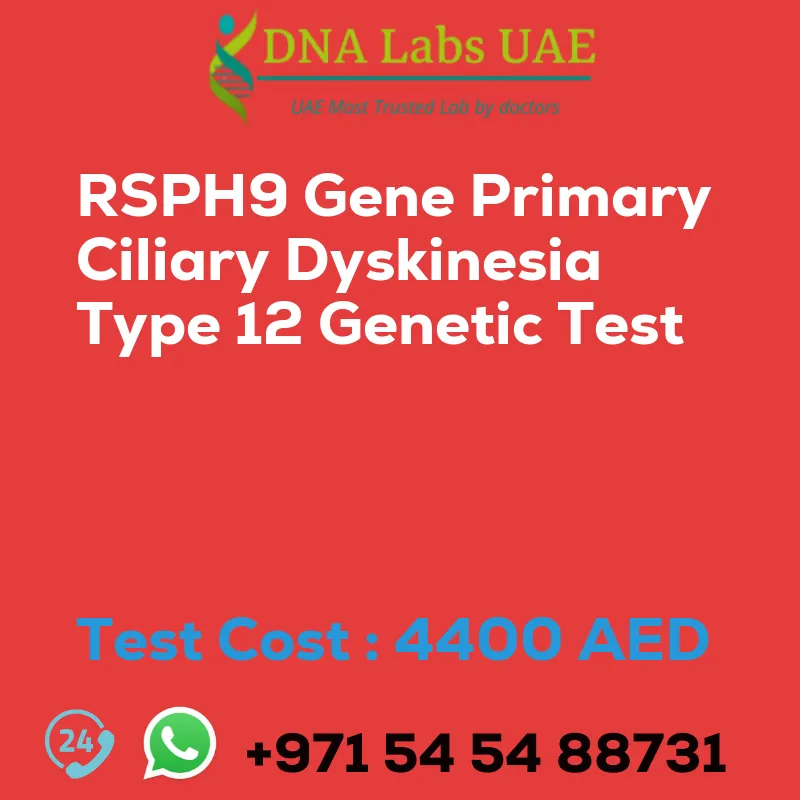RSPH9 Gene Primary Ciliary Dyskinesia Type 12 Genetic Test
At DNA Labs UAE, we offer the RSPH9 Gene Primary Ciliary Dyskinesia Type 12 Genetic Test. This test is designed to analyze the RSPH9 gene, which is associated with primary ciliary dyskinesia type 12.
Test Components
- Price: 4400.0 AED
Sample Condition
We accept blood or extracted DNA samples for this test. Alternatively, you can provide one drop of blood on an FTA card.
Report Delivery
Expect your test results to be delivered within 3 to 4 weeks.
Method
We utilize NGS (Next-Generation Sequencing) technology to perform this genetic test.
Test Type
This test is specifically designed to diagnose and identify genetic abnormalities related to ear, nose, and throat disorders.
Doctor
An ENT doctor will oversee the testing process and interpret the results.
Test Department
This test falls under the genetics department at DNA Labs UAE.
Pre Test Information
Before undergoing the RSPH9 Gene Primary Ciliary Dyskinesia Type 12 Genetic Test, it is important to provide the clinical history of the patient. Additionally, a genetic counseling session will be conducted to draw a pedigree chart of family members affected by the EYA1 Gene Branchiootic Syndrome Type 1 NGS Genetic DNA Test gene EYA16.
Test Details
The RSPH9 gene is associated with primary ciliary dyskinesia type 12, a genetic disorder that affects the structure and function of cilia in the body. Cilia are tiny, hair-like structures found on the surface of cells and play a crucial role in moving mucus and other substances along the respiratory tract, reproductive system, and other organs.
Primary ciliary dyskinesia (PCD) is a rare genetic disorder characterized by abnormal ciliary function, leading to recurrent respiratory infections, chronic cough, bronchiectasis, and infertility. PCD can also affect other organs such as the ears, sinuses, and heart.
NGS (Next-Generation Sequencing) genetic testing is a high-throughput method used to analyze multiple genes simultaneously. In the context of PCD, NGS can be used to identify mutations or variations in the RSPH9 gene that may be responsible for the disorder. This type of genetic testing can provide valuable information for diagnosis, prognosis, and genetic counseling.
If you suspect that you or someone you know may have primary ciliary dyskinesia type 12, it is recommended to consult with a healthcare professional or genetic counselor who can guide you through the process of genetic testing and provide appropriate support and guidance.
| Test Name | RSPH9 Gene Primary ciliary dyskinesia type 12 Genetic Test |
|---|---|
| Components | |
| Price | 4400.0 AED |
| Sample Condition | Blood or Extracted DNA or One drop Blood on FTA Card |
| Report Delivery | 3 to 4 Weeks |
| Method | NGS Technology |
| Test type | Ear Nose Throat Disorders |
| Doctor | ENT Doctor |
| Test Department: | Genetics |
| Pre Test Information | Clinical History of Patient who is going for EYA1 Gene Branchiootic syndrome type 1 NGS Genetic DNA Test. A Genetic Counselling session to draw a pedigree chart of family members affected with EYA1 Gene Branchiootic syndrome type 1 NGS Genetic DNA Test gene EYA16 |
| Test Details |
The RSPH9 gene is associated with primary ciliary dyskinesia type 12, a genetic disorder that affects the structure and function of cilia in the body. Cilia are tiny, hair-like structures found on the surface of cells and play a crucial role in moving mucus and other substances along the respiratory tract, reproductive system, and other organs. Primary ciliary dyskinesia (PCD) is a rare genetic disorder characterized by abnormal ciliary function, leading to recurrent respiratory infections, chronic cough, bronchiectasis, and infertility. PCD can also affect other organs such as the ears, sinuses, and heart. NGS (Next-Generation Sequencing) genetic testing is a high-throughput method used to analyze multiple genes simultaneously. In the context of PCD, NGS can be used to identify mutations or variations in the RSPH9 gene that may be responsible for the disorder. This type of genetic testing can provide valuable information for diagnosis, prognosis, and genetic counseling. If you suspect that you or someone you know may have primary ciliary dyskinesia type 12, it is recommended to consult with a healthcare professional or genetic counselor who can guide you through the process of genetic testing and provide appropriate support and guidance. |








